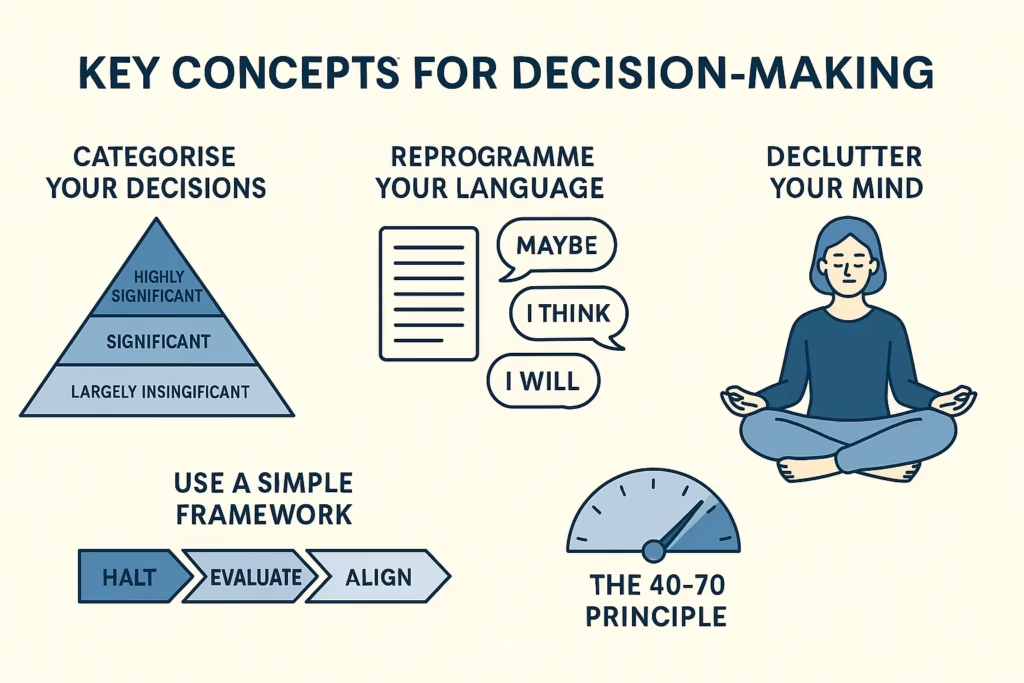Until now, I have struggled with decision-making. It doesn’t matter which decision—small or large.
Even everyday decisions such as what to wear, what to order, which show to watch, or what hairstyle to go for have been challenging for me to make.
In this blog, I will go through the steps and approaches I’ve used to combat this overthinking, based on both personal experience and decision-making frameworks backed by psychological principles.
Categorise your Decisions
The first step is to recognise that every decision has a different value.
To become an effective decision-maker, you have to categorise your decisions into levels of priority, like I also discuss in my personal growth section.
High-impact decisions require the most time and thought. Small, everyday choices should be made quickly so they don’t drain your energy for more meaningful decisions.
| Decision Level | Examples |
| Level 1 – Largely Insignificant | What to wear, What to eat, Where to go for a walk |
| Level 2 – Significant | What project to work on for the next month, Where to go on holiday |
| Level 3 – Highly Significant | Who to marry, Which career path to take, What degree to take, Which house to buy |
Start by categorising your decisions into these levels. It simplifies your mental load and clarifies what really deserves your time.
Level 1 decisions should take under two minutes. Level 2 might need 20–60 minutes. Level 3 decisions need deeper consideration using a structured decision-making framework.
Even if you make the wrong decision, the cost of indecision is often greater. It’s a skill worth mastering.
Reprogramming Your Language
Looking at old messages and notes, I realised how often I used uncertain language—”maybe,” “I think,” “possibly.” This mirrored my internal indecision.
While my attention to detail is a strength, it led to paralysis. I would over-analyse every option before acting.
A good example was trying to create a business budget. I was too cautious with projections and forgot that aspirational budgeting can be just as powerful.
Once I began using clearer, more decisive language, my mental load reduced. My communication with my team, friends, and partner improved dramatically.
I know there’s skepticism around Neuro-Linguistic Programming (NLP), but its principle of language shaping thought rings true in my experience.

Use a Simple Framework for Decision-Making
Once you’re reprogramming your language, you’ll still need a structure for big decisions. Here’s one I use:
Halt
Pause and reflect. Write down the decision and what you know.
Evaluate
Consider the pros and cons. For help, you can look at our post on boosting productivity with reflection tools.
Align
Does the decision align with your values and goals? If not, it might not be worth it.
Decide
Take action. You’ll learn more from doing than endlessly analysing.
The 40-70 Principle
According to former U.S. Secretary of State Colin Powell, if you have less than 40% of the information, don’t decide. If you wait for more than 70%, you’re waiting too long. This is the 40–70 rule.
Life rarely provides perfect clarity. This rule helps you act with confidence amid uncertainty.
Optimise for Luck
You’ve likely heard, “You make your own luck.” But it’s also a decision-making strategy: choose the path with the most upside potential.
Choosing between job offers? One is stable, the other is a startup offering faster growth and broader experience. The riskier option may open unexpected doors. Same for investments: two well-researched companies, but one has a moonshot opportunity.
Let luck work in your favour by choosing paths that multiply your chances of unexpected success.
Declutter Your Mind
You may struggle with decision-making simply because you’re making too many decisions daily.
After reading The One-Minute Manager, I realised my business partner and I were caught up in too many micro-decisions.
Small decisions pile up and block you from focusing on strategic ones. Reduce your mental load by batching or automating trivial choices.
I now do 10-minute meditations before gym sessions to clear my mind. Also, be mindful of decision fatigue—it’s real and time-of-day matters. Early morning? Better judgment. Late night after clubbing? Not so much.


